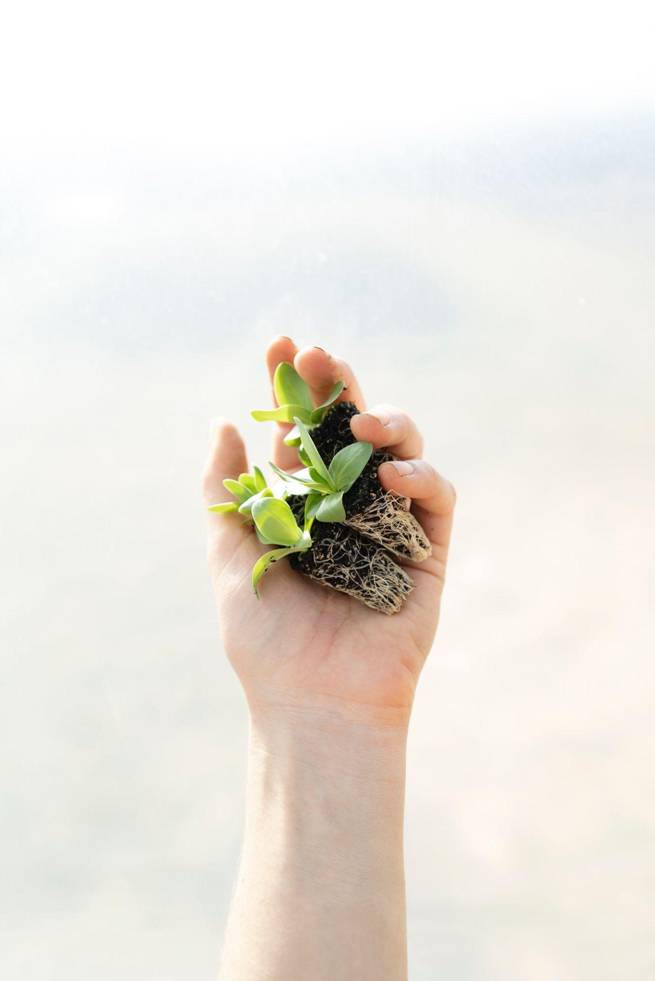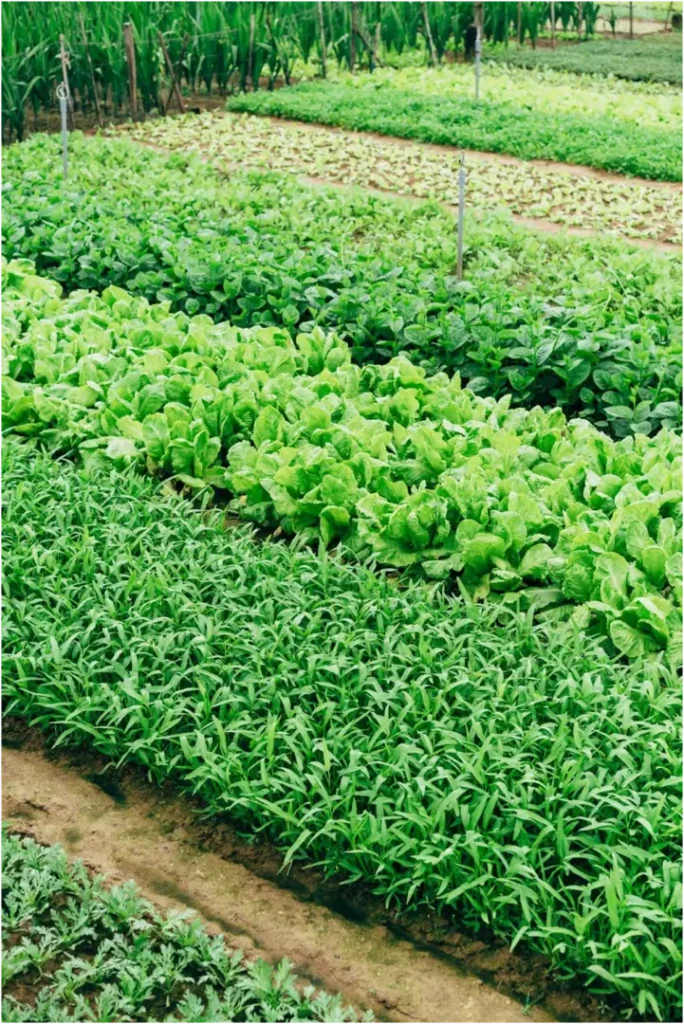
Biodynamic Farming:
Why It Matters for Your Food Choices
You want your food dollars to support sustainable food choices and you want to nourish your body the best you can. Organic farming is lighter on the planet and better for your health than conventional methods because it eschews synthetic amendments like petroleum-based fertilizers and toxic pesticides that can wreak havoc on our bodies and throughout the ecosystem. While organic farming is far better than the industrialized farming methods that took shape in the early part of the 20th century and now sadly represents the majority of the food production in the US, there is an even better way to farm still. While Organic Farming is easier on the planet than conventional farming, an Organic Certification doesn’t necessarily mean harm free or fully sustainable. The Organic methodology focuses primarily on switching toxic inputs with less damaging ones. Organic doesn’t necessarily account for ways that farms can become more self-sustaining and even beneficial for the natural areas surrounding them. That’s where Biodynamic Farms come in.
Biodynamic has been called the ‘new organic.’ In truth, the idea of biodynamic farming has been around since the 1920’s, but is definitely having a moment, as people have become increasingly educated and concerned about the way food production impacts the planet and health. Biodynamic Farming goes a step further than Organic in that, like Organic farming, it strives to avoid harming the environment, but also works to actively work to improve it and to be fully sustainable. The result is a healthier eco—system and more nutritious foods.
To date there are over 5,000 farms that are certified in 55 countries worldwide offering products ranging from wine to baby food to conscientious consumers. More and more, consumers are wanting to support this movement and looking for Biodynamic products. We’ve assembled a list of some of our favorites below.
Want to know more? Learn more about this burgeoning agriculture movement here.

What is Biodynamic Farming?
Biodynamic farming is an ethical, ecological, and holistic approach to food production that aims to put the needs of the natural world on an even playing field as profitability.
This farming philosophy got its start in 1924 when philosopher and scientist Dr. Rudolf Steiner presented a series of lectures to farmers. He introduced a new approach to growing food that intermeshed scientific understanding with natural principles and a touch of the spiritual.
His ideas of an integrated farming system were a direct challenge to the era’s push for industrialization that viewed farms as factories that needed outside inputs like synthetic fertilizers to maximize efficiency.
In the following years, other farmers and researchers continued developing his views into a cohesive ideology that others could follow that came to be known as biodynamic farming.

Why Does Biodynamic Farming Matter?
Biodynamic farming’s central premise is that every farm is an integrated, living organism made of interdependent elements. Biodynamic farmers believe the health of each part is essential for the viability of the whole, and as such, work to nurture and harmonize every aspect of their growing space.
Here’s a closer look at why biodynamic farming offers a better way forward for both our food system and the natural world.
Produces Healthier Food
You are only as healthy as the food you eat, and that’s true for your food as well. All biodynamic produce is grown without the toxic pesticides and herbicides found in non-certified produce that can mess with your hormones and increase your risk of developing cancer.
Likewise, biodynamic farming’s focus on soil health means that fruits and vegetables contain higher concentrations of essential antioxidants like beta-carotene and vitamin C. In contrast, decades of intensive growing practices have depleted farmland in the US to the point that the produce in the grocery store contains fewer nutrients than it did decades ago.
Promotes Natural Biodiversity
Biodynamic farming emphasizes supporting and preserving the natural habitats that surround farm fields. At least 10% of total farm acreage must be set aside for biodiversity and growers use measures that enhance the local ecosystem like perennial crops, pollinator hedgerows, and native plants.
Supports Humane Treatment of Animals
The principles of biodynamic farming put animal health first with the understanding that the entire farming system benefits from their wellbeing. For example, dairy animals are raised on their mother’s milk (not milk replacer), chicken beaks aren’t clipped, and all animals receive food that’s appropriate to their digestive system and have access to free-range forage outdoors.
Integrates Plants and Animals in the Food System
Biodynamic farms strive to emulate the natural world, where plants and animals coexist and complement each other. Instead of massive fields growing only a single crop, as is common with many organic farms, a biodynamic approach prioritizes a diversity of crops and livestock that interact with each other in different ways.
Supports On-farm Fertility
Soil health is of maximum importance on a biodynamic farm. Farmers generate their fertility through compost, cover crops, animal manure, and liquid sprays known as biodynamic preparations. For livestock, at least 50% of their feed must be produced on the farm. This decreases the reliance on off-site fertility and makes the farm more self-sufficient.
Works with Earth’s Rhythms
Biodynamic farming looks beyond earth to the rhythms and cycles of the sun, moon, and other celestial forces. Planting and harvesting calendars take astronomical information into account to optimize their timing.
Preserves Heirloom and Heritage Species
Biodynamic farming aims to preserve crop and livestock diversity by choosing heritage breeds and open-pollinated, heirloom, and non-GMO seed varieties whenever possible. Many farms have worked to stabilize species populations on the brink of extinction and increase their prevalence in other farming communities.
Approaches Pests and Disease Problems Holistically
By cultivating healthy soil and creating conditions for optimal plant and animal health, biodynamic farming aims to give each species the necessary tools to naturally fight off pest and disease problems. Outbreaks are seen as indications of an imbalance and a chance to restore the system through biological controls, rather than toxic sprays.
Focuses on Future Sustainability
The central goal of biodynamic farming is to improve the health of our food production system. As such, certified farms emphasize practices that will support agriculture long into the future and don’t sacrifice tomorrow’s potential for quick profits today.
Top Biodynamic- Certified Brands and Businesses
Today, the best way to find biodynamic farms and farm products in America is to look for official certification from Demeter USA. Certification means that farms meet all the requirements of the National Organic Program and the stricter standards of biodynamic growing.
Below are some of the farms and brands offering biodynamic products today.
Best Restaurant
Universe Mirazur: Considered one of the best restaurants in the world, the Universe Mirazur went through a complete overhaul during the Covid-19 lockdown in France. Today, it offers a brand new menu focused on highlighting the pillars of biodynamic farming.
Five local biodynamic farms and gardens supply fresh produce to the restaurant, which emphasizes the interconnectedness of both the natural and the cultivated with its menu.
Best Wines
Narrow Gate Vineyards: This boutique winery in Placerville, CA, offers inspired wines made with minimal intervention so that the natural flavors of the grapes grown in the certified-biodynamic vineyards can speak for themselves. Visit in-person to enjoy the winery’s candlelit cellar tasting room.
Montinore Estate: As one of the largest producers of certified estate wines made from biodynamic grapes, Montinore Estate boasts over 200 acres of Demeter-certified grapevines. This Oregon-based winery specializes in pinot noirs and cool climate whites.
Solminer Wine: With a name that literally means “mining the sun,” Solminer Wine focuses on soil health for its biodynamic-certified California wines. You can visit in person, purchase vintages online, and even join the winery’s renowned wine club.
Best Skincare Products
Éminence Organic Cornflower Recovery Serum: Take care of your skin with this lotion formulated with biodynamic certified ingredients like cornflower and clary sage.
Weleda Baby Products: This wellness brand uses calendula blossoms cultivated in Europe’s biggest biodynamic plant garden.
Best Food
Hawthorne Dairy: As one of the first US dairies to become certified organic, Hawthorne Dairy remains a trendsetter with its growing biodynamic product line. To date, all products are 100% certified USDA organic, and its Alpine and plain yogurt are certified Biodynamic.
Lakewood Fresh Pressed Juice: This small-batch juice company has a line of certified biodynamic drinks made from fresh-pressed mangoes, apples, beets, cranberries, and pomegranates.
Food Match Biodynamic Kalamata Olives: These biodynamic-certified olives have a smokey taste with red wine undertones, thanks to the biodynamic-certified red wine vinegar used as a preservative. You can eat them fresh or pair them with feta and pitas for a refreshing snack.
White Leaf Provisions: This baby food company sells a range of fruit-based purees and apple sauces that are certified biodynamic so you get a better sense of what you’re really feeding your child.
Crofters Organic Biodynamic Jam Spread: This jam company sells a line of certified biodynamic spreads in apricot, strawberry, and blueberry that have 33% less sugar than preserves.
Acropolis Biodynamic Extra Virgin Olive Oil: You can cook with confidence with this certified biodynamic extra virgin olive oil from single-origin olives grown in Italy.
Deep Valley Biodynamic Coffee: Brew the best each morning with this certified biodynamic coffee that comes from a single estate in Espirito Santo, Brazil.
Story by: Lydia Noyes
